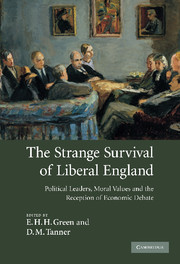 The Strange Survival of Liberal England
The Strange Survival of Liberal England Book contents
- Frontmatter
- Contents
- Acknowledgements
- List of abbreviations
- List of contributors
- Introduction
- Part I Economic ideas and political leaders
- 1 Utilitarian or Neo-Foxite Whig? Robert Lowe as Chancellor of the Exchequer
- 2 Political economy, the labour movement and the minimum wage, 1880–1914
- 3 Economic interpretations of war: American liberals and US entry into World War I
- 4 Political leadership, intellectual debate and economic policy during the second Labour government, 1929–1931
- Part II The use and abuse of economic ideas: Keynes and his interpreters
- Part III Economic forces and their significance
- Index
2 - Political economy, the labour movement and the minimum wage, 1880–1914
Published online by Cambridge University Press: 04 July 2009
- Frontmatter
- Contents
- Acknowledgements
- List of abbreviations
- List of contributors
- Introduction
- Part I Economic ideas and political leaders
- 1 Utilitarian or Neo-Foxite Whig? Robert Lowe as Chancellor of the Exchequer
- 2 Political economy, the labour movement and the minimum wage, 1880–1914
- 3 Economic interpretations of war: American liberals and US entry into World War I
- 4 Political leadership, intellectual debate and economic policy during the second Labour government, 1929–1931
- Part II The use and abuse of economic ideas: Keynes and his interpreters
- Part III Economic forces and their significance
- Index
Summary
In 1974 Peter Clarke published a celebrated paper on the progressive movement in England. The article began with the modest proposal that ‘American historiography can … suggest valuable lines of analysis which have not been fully applied to Britain’. In particular, it was claimed, the study of American progressivism disclosed the need to pay due attention to the role of ideas in the history of social reform. In characteristically mischievous fashion, the author noted that ‘it would not, perhaps, be fair’ to say ‘that in England we purposely write history with the ideas left out’. The paper proceeded to address this lacuna through an examination of how British progressives defined their relationship with organised labour through their ideas. As such, it enunciated a developing interest in the place of ideas in political history; more specifically, it expressed a deep and enduring engagement with the politics of economics and the relationship between social democrats and the labour movement.
This chapter shares these concerns. It focuses upon a political question that raised large economic issues and sparked a complex debate amongst progressives and the labour movement. It draws too upon the Anglo-American comparison highlighted by Clarke's paper. As historians have increasingly recognised, transatlantic traffic played a significant role in the development of ideas about social policy in the pre-1914 period. In the case of the minimum wage, as Hart and Skocpol have noted, links between British and American reformers were manifold.
- Type
- Chapter
- Information
- The Strange Survival of Liberal EnglandPolitical Leaders, Moral Values and the Reception of Economic Debate, pp. 62 - 88Publisher: Cambridge University PressPrint publication year: 2007
- 3
- Cited by
